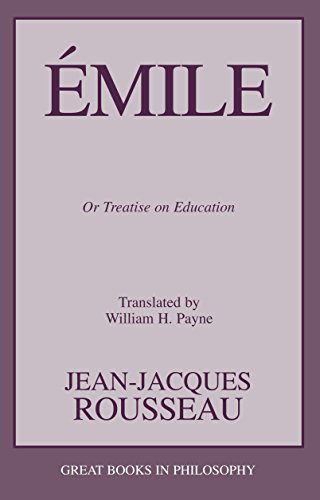Verwandte Artikel zu Emile: Or Treatise on Education: 20 (Great Books in...

Zu dieser ISBN ist aktuell kein Angebot verfügbar.
Alle Exemplare der Ausgabe mit dieser ISBN anzeigen:Die Inhaltsangabe kann sich auf eine andere Ausgabe dieses Titels beziehen.
Imagining a typical boy named Émile, Rousseau creates an ideal model of one-on-one tutelage from infancy to manhood with himself as the child's mentor. "Everything is good as it comes from the hands of the Author of Nature; but everything degenerates in the hands of man." This is the first of many provocative statements that characterize this work and are a hallmark of Rousseau's arresting rhetoric. As in so many of his other famous works, here too Rousseau asserts his main thesis that human beings by nature are good; it is only the distorting influences of civilization that have corrupted them.
If this is true, then in educating children one must do nothing to interfere with human nature in its natural course. Far from being the chief means by which society inculcates its rules and principles, education should be the method of helping youths discover the inherent truths of their own human nature. From infancy to young adulthood learning should come purely from personal experience. Rather than imparting facts, teachers should foster self-discovery, so that knowledge is acquired through following innate curiosity, not vicariously through the statements of others.
Educators as well as students of philosophy will find much to admire in Rousseau's original and still radical ideas.
Rousseau's literary career began with his entry in an essay contest in 1749 on the subject of the relationship of science and the arts to morals. His winning essay, Discourses on Sciences and the Arts, soon became the foundation for his later work entitled the Discourse on the Origin of Inequality (1753). With its publication, he became a figure of some controversy in France. Ideological differences between his views and those of his Enlightenment contemporaries soon surfaced, and Rousseau once again found himself alienated from the intellectual establishment.
His differences with the philosophes proved to be the impetus for Rousseau's future work on the content of human nature and man's relationship to society and the state. Contrary to the individualism and intellectual enlightenment advocated by his contemporaries, Rousseau sought to sublimate individuality in the security of the collective personality known as the general will. This new society would be typified by concern for the community and would be ruled by laws developed through a plan of controlled participation. Rousseau's social theory was developed in his work Julie, ou la Nouvelle Heloise (1761) and in Emile (1762). The institutional structure was constructed in The Social Contract (1761).
In Emile, Rousseau presents his utopian vision of child-centered education, full of the sentiments of Romanticism, a movement that Rousseau inspired.
Rousseau's later years were spent fighting off persecution, both real and imaginary. He died near Paris on July 2, 1778.
„Über diesen Titel“ kann sich auf eine andere Ausgabe dieses Titels beziehen.
- VerlagPrometheus Books
- Erscheinungsdatum2003
- ISBN 10 1591021111
- ISBN 13 9781591021117
- EinbandTapa blanda
- Anzahl der Seiten315
- Bewertung
Gebraucht kaufen
Zustand: GutIn his pioneering treatise on education... Mehr zu diesem Angebot erfahren
Versand:
EUR 5,68
Von Vereinigtes Königreich nach USA
Beste Suchergebnisse beim ZVAB
Emile: Or Treatise on Education: 20 (Great Books in Philosophy)
Buchbeschreibung Paperback. Zustand: Very Good. In his pioneering treatise on education the great French philosopher presented concepts that had a significant influence on the development of pedagogy, and yet many of his ideas still sound radical today. Written in reaction to the stultifying system of rote learning and memorization prevalent throughout Europe in Rousseau's time, Emile is a utopian vision of child-centered education, full of the sentiments of Romanticism, which Rousseau himself inspired. Imagining a typical boy named Emile, Rousseau creates an ideal model of one-on-one tutelage from infancy to manhood with himself as the child's mentor. "Everything is good as it comes from the hands of the Author of Nature; but everything degenerates in the hands of man." This is the first of many provocative statements that characterize this work and are a hallmark of Rousseau's arresting rhetoric. As in so many of his other famous works, here too Rousseau asserts his main thesis that human beings by nature are good; it is only the distorting influences of civilization that have corrupted them. If this is true, then in educating children one must do nothing to interfere with human nature in its natural course. Far from being the chief means by which society inculcates its rules and principles, education should be the method of helping youths discover the inherent truths of their own human nature. From infancy to young adulthood learning should come purely from personal experience. Rather than imparting facts, teachers should foster self-discovery, so that knowledge is acquired through following innate curiosity, not vicariously through the statements of others. Educators as well as students of philosophy will find much to admire in Rousseau's original and still radical ideas. The book has been read, but is in excellent condition. Pages are intact and not marred by notes or highlighting. The spine remains undamaged. Artikel-Nr. GOR008995882
Weitere Informationen zu diesem Verkäufer | Verkäufer kontaktieren

